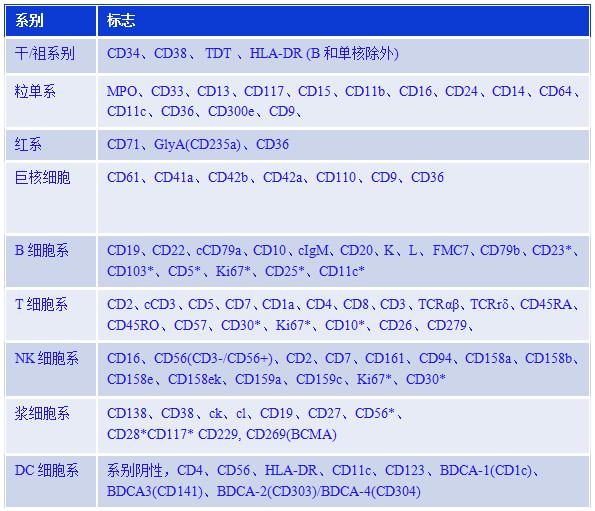
流式细胞术(flow cytometry, FCM)根据抗原抗体反应结合,激光激发荧光素显色,检测细胞免疫学标志的表达,其对临床疾病可进行免疫分型。该技术对于正确诊断疾病、微小残留病变监测治疗效果和评价预后,以及帮助寻找免疫治疗的靶点、预估靶向治疗的毒性等方面都起到了举足轻重的作用。应用领域也从最初的急性白血病检测,拓宽到成熟淋巴细胞肿瘤、急性髓系白血病以外的髓系肿瘤、非造血系统肿瘤、遗传及免疫缺陷疾病等众多疾病的检测。
流式细胞术原理
流式细胞是利用抗原抗体反应和激光激发荧光来识别活细胞的技术。细胞表面和胞浆内会表达各种标志,我们试探性地加入偶联荧光素的抗体,如果细胞表达这种抗原,抗体就会与抗原结合,把五颜六色的荧光素带到细胞上。
检测时,细胞们一个个排队通过激光照射,如果细胞结合这种荧光素,就会显色,不同的细胞各自发出他们绚烂的荧光,经过软件处理,成为我们看到的图片。
流式细胞检测在血液病诊断中的意义
临床上怀疑有血液系统疾病的患者,医生会让患者去做免疫分型。血液病免疫分型就像盲人摸象,通过试探性地加入荧光标记的单抗,识别白血病细胞表达的抗原,确定白血病细胞的系列来源以及分化阶段。

流式常用的抗体
流式细胞术免疫分型对于进行骨髓细胞形态学,骨髓细胞化学染色不能进行分型的急性白血病,混合性白血病意义尤其重大,还可以用于幼稚细胞数目特别少,微小残留白血病的检测。
免疫分型是用于作为诊断血液恶性肿瘤不可缺少的重要标准之一。目前国际上通用的是细胞形态学(Morphology)、免疫学(Immunology)、细胞遗传学(Cytogenetics)和分子生物学(Molecular)分型,即我们常说的MICM分型。通过急性白血病的MICM分型,可以将急性白血病亚型的诊断精确性提高到97-98%。
参考资料:
1 Wood BL, Arroz M, Barnett D, et al. 2006 Bethesda International Consensus recommendations on the immunophenotypic analysis of hematolymphoid neoplasia by flowcytometry: optimal reagents and reporting for the flowcytometric diagnosis of hematopoietic neoplasia[J]. Cytometry B Clin Cytom, 2007,72B:S14-S22.
2 Craig F, Foon K. Flow cytometric immunophenotyping for hematologic neoplasms[J]. Blood, 2008,111(8):3941-3967.
3 Jaffe ES, Harris NL, Stein H, et al. Introduction and overview of the classification of the lymphoid neoplasms[M]//Swerdlow SH, Campo E, Harris NL, et al. WHO Classification of Tumours of Haematopoietic and Lymphoid Tissues: Fourth Edition. Lyon: IARC Press, 2008: 158-166.
4 Johansson U, Bloxham D, Couzens S, et al. Guidelines on the use of multicolour flow cytometry in the diagnosis of haematological neoplasms[J]. Br J Haematol, 2014,165(4):455-488.
5 van Dongen JJ, Lhermitte L, B?ttcher S, et al. EuroFlow antibody panels for standardized n-dimensional flow cytometric immunophenotyping of normal, reactive and malignant leukocytes[J]. Leukemia, 2012,26(9):1908-1975.
6 Kalina T, Flores-Montero J, van der Velden VH, et al. EuroFlow standardization of flowcytometer instrument settings and immunophenotyping protocols[J]. Leukemia, 2012,26(9):1986-2010.
文:于洋(检验科)
编辑:宋羽倩